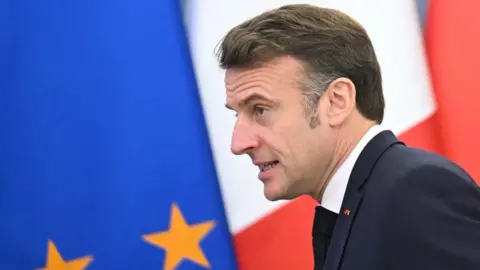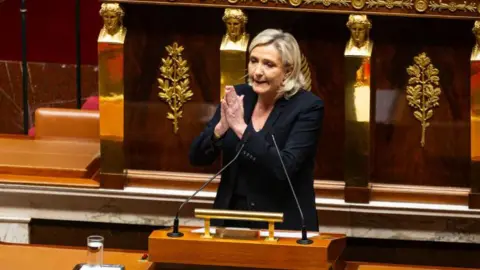Macron meets centrist Bayrou ahead of imminent decision on France’s next Prime Minister

 SERGEI GAPON/AFP
SERGEI GAPON/AFPPresident Emmanuel Macron met with centrist leader François Bayrou on Friday as speculation grew over who he would choose as Prime Minister, in a bid to end months of political violence.
It has now been nine days since French MPs ousted Michel Barnier as prime minister in a vote of no confidence, and Macron said a replacement would be appointed by the end of Thursday.
Bayrou was widely seen as a potential successor. He is a colleague of Macron, the mayor of the south-west and the leader of the radical MoDem party.
French politics have been in turmoil since Macron called snap parliamentary elections for the summer, and if he names a new prime minister, it will be his fourth this year.
A BFMTV opinion poll on Thursday suggested that 61% of French voters are worried about the political situation.
Macron cut short a trip to Poland on Thursday and was expected to name his new prime minister last night, but then postponed his announcement until Friday morning.
Macron has vowed to remain in office until his second term ends in 2027, despite Barnier’s fallout last week.
If he chooses Bayrou, the challenge will be to form a government that will not be brought down the way Barnier was done in the National Assembly.
It is thought that he will want to bring the parties to the center left in the government, or agree to a deal so as not to destroy the next prime minister.
Macron has already held round table talks with the leaders of all major political parties, blocking France Unbowed (LFI) of Jean-Luc Mélenchon and the National Rally of Marine Le Pen.
Among the other favorites to succeed Michel Barnier, who only served three months as prime minister, are Defense Minister Sebastien Lecornu and former left-wing prime minister Bernard Cazeneuve.
French media quoted another potential candidate, former foreign minister Jean-Yves Le Drian, as saying he turned down the job because he was in his late 70s.
Former Brexit negotiator Barnier was voted out as Le Pen’s National Rally joined left-wing MPs in rejecting his 60 billion euro (£50bn) plans for tax cuts and tax hikes. He wanted to reduce France’s budget deficit, which is expected to reach 6.1% of GDP this year.
Under the political system of the Fifth Republic of France, the president is elected for five years and appoints the prime minister who is chosen by the Cabinet and then appointed by the president.
In an unusual move, President Macron called snap parliamentary elections for the summer after poor results in June’s EU elections. The result left France in a political quagmire, with three major political blocs formed on the left, the center and the far right.
He eventually chose Barnier to form a minority government that relied on Marine Le Pen’s National Rally for survival. But now that has fallen, Macron is hoping to restore stability without relying on his party.
 Getty Images
Getty ImagesThree left-wing parties – the Socialists, Greens and Communists – have split from the left-wing LFI and are participating in negotiations to form a new government.
However, they have made it clear that they want to see the left-wing prime minister they have chosen if they are going to join a larger government.
“I told you that I want someone from the left and the Greens and I think that Bayrou is neither one nor the other,” Greens leader Marine Tondelier told French TV on Thursday, adding that he did not see the majority camp losing a member of parliament. election can hold the position of prime minister and maintain the same principles.
Relations between the centre-left and Jean-Luc Mélenchon’s hard-line LFI appear to be fraying with the three parties’ decision to pursue talks with President Macron.
After the LFI leader asked his allies to abandon the coalition agreement, Olivier Faure of the Socialists told French TV that “the louder Mélenchon shouts the less he is heard”.
Meanwhile, Marine Le Pen has called for consideration of her party’s policies regarding the cost of living in the next government, by creating a budget that “does not cross the red lines of each party”.
Michel Barnier’s governing government has tabled a bill that would allow the provisions of the 2024 budget to continue until next year. But a replacement budget for 2025 will have to be approved when the next government takes office.
Source link




